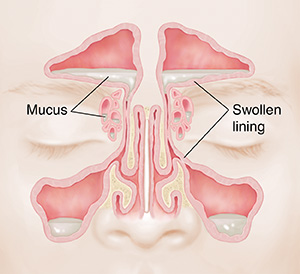Chronic Sinusitis
Chronic Sinusitis
Chronic sinusitis is a long-term swelling or infection of the sinuses. If sinusitis lasts more than 12 weeks, it is called chronic.

What is chronic sinusitis?
Sinuses are air-filled spaces in the skull behind the face. They are kept moist and clean by a lining of mucosa. Things such as pollen, smoke, and chemical fumes can irritate the mucosa. Constant exposure to irritants can cause ongoing inflammation of this lining. It can also damage tiny hairlike cilia that cover the mucosa. Cilia help carry mucus toward the opening of the sinus. Damage to cilia keeps mucus from draining from the sinuses.
Causes of chronic sinusitis
Problems that irritate the mucosa or block drainage can lead to chronic sinusitis. These may include:
-
Infections
-
Chronic allergies
-
Nasal polyps, deviated septum, or other blockages
-
Constant exposure to irritants, such as cigarette smoke or fumes
-
Asthma
-
Acute sinusitis that keeps coming back
Common symptoms of chronic sinusitis
Symptoms may include:
-
Facial pain and pressure
-
Headache and sinus pain
-
Nasal congestion
-
Thick, colored drainage from the nose
-
Thick mucus draining down the back of the throat (postnasal drainage)
-
Loss of smell
-
Fever
-
Cough
-
Sore throat
Diagnosing chronic sinusitis
Your doctor will ask about your symptoms and health history. The doctor will look at your nose and face. You may have imaging studies such as an X-ray or CT scan of the sinuses. Your doctor may also take a sample of the drainage to check for bacteria. You may also have an endoscopy. During this test, the doctor puts a lighted tube through your nose up into your sinuses to look at the sinuses.
Treating chronic sinusitis
Treatment involves reducing irritation and inflammation. Your plan may include:
-
Taking medicines. Your doctor may prescribe medicines to reduce the amount of mucus and swelling. These help unblock the sinuses and allow them to drain. You will need to take antibiotics if you have a bacterial infection.
-
Flushing your sinuses. Your doctor may suggest sinus irrigation. This is flushing your sinuses with saltwater or saline solution. This helps to clear out mucus.
-
Controlling allergies. If you have allergies, you should have a plan to help control them. This plan may include medicines or allergy shots.
-
Having surgery. In some cases, you may need surgery on the nose, sinuses, or both. This can improve sinus drainage or remove nasal blockages.
Updated:
March 15, 2019
Reviewed By:
Ashutosh Kacker MD